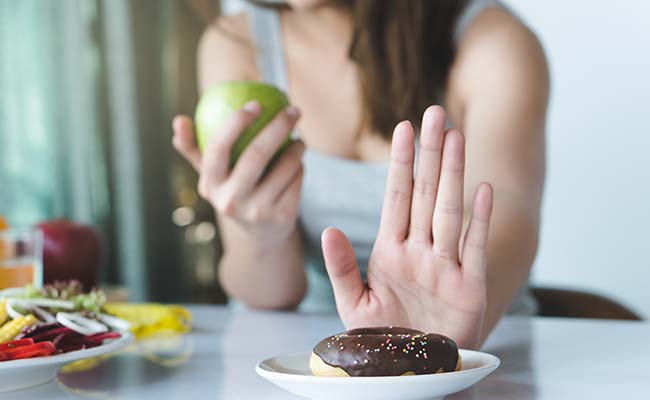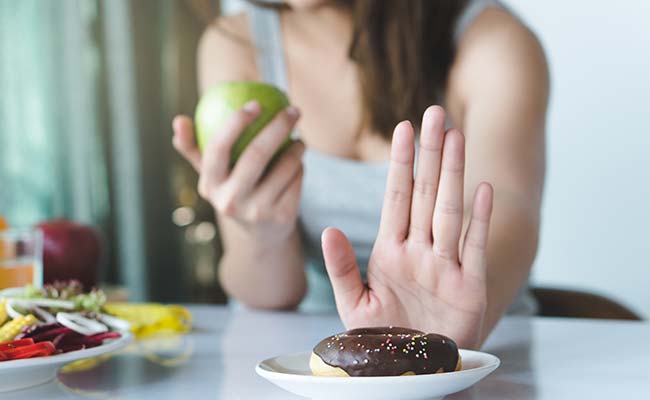Sugar-free diet: benefits and precautions
Sugar is the most addictive of foods. Its repercussions on the mind and the hormonal system are substantial, so much so that few people are able, when they are used to consuming it in large quantities, to come close to it.
Yet a sugar-free diet is arguably the best way to stay healthy, slim and have more energy.
Let’s take stock of the advantages of a sugar-free diet, as well as the difficulties to get around to manage to give up for good this poison of the body and the mind.
The benefits of eating without sugar
Sugar is not a food that is readily found in nature, as it is.
And our body, while running primarily on glucose, is also not set up to deal with the inconstancies and empty calories of sugar.
Knowing how to give up fast sugars , invented and produced by man, is a huge step towards chronic health and well-being.

A sugar-free diet has concrete benefits for fitness and health:
- Reduced risks of chronic diseases
- Better control of your hunger and appetite
- Constant energy levels
- Better mental balance
- Better body composition
- Better weight management
- Better dental health
- Less allergies
The difficulties to be circumvented
Cutting back and giving up sugar can have real challenges, especially in the first few weeks, ranging from depression to loss of energy.
The consequences of a lack of sugar on the mind
The consumption of sugar affects our reward system in the brain, a factor favoring survival, but also and especially addiction .
Food is a natural reward, which stimulates the brain and causes us to eat more.
This stimulation gets out of hand in the case of sugar, because the brain controls a greater secretion of dopamine, as it is with hard drugs .

Also, sugar can cause a lot of opioid secretion in the brain, which naturally increases the intensity and frequency of cravings.
Consuming sugar regularly has a direct impact on the brain: it gets used to it, becomes dependent on it, and needs more and more.
Thus, giving up sugar has direct and immediate consequences on morale .
Some people will feel depressed, anxious, sleep poorly, have difficulty concentrating, and above all suffer from unbearable cravings.
The consequences on the physical
When the body is used to having inexhaustible stores of glucose, the simple fact of reducing its intake of rapid sugars can cause certain disorders such as :
- A waste of energy
- No more fatigue
- Less motivation
- Nausea
- Headaches
Our tips for successfully giving up sugar
In order to stop consuming sugar and stick to it over the long term, a few precautions should be considered.
For starters, it is better to gradually reduce your sugar intake so as not to suffer from too great drops in energy and morale, which could put this diet in check.
More protein and fiber
Adding protein to each of your meals can help you feel less hungry, and also increase your energy. Protein, found in meats, dairy products, eggs or fish, is a nutrient that is naturally satiating and energy intensive . Its metabolism costs the body energy: not only do you feel full for longer, but some of the calories from protein are burned during digestion.
Fiber intake is necessary for digestion, to feed our microbiota and to regulate blood sugar levels. Stable blood sugar significantly reduces cravings for sugar.
Manage stress and sleep better

Stress amplifies caloric needs and can generate food urges, oriented towards sugary foods.
Sugar increases serotonin concentrations in the brain , which causes calming. Thus, it is important to learn to manage your stress so as not to succumb to the instinctual temptations that can govern us.
Playing sports, or doing an activity like yoga or meditation can really help you break the vicious cycle of sugar addiction, and also help you sleep better.
Did you know that all people who lack sleep store fat more easily?
This is in part due to hormonal imbalance, which leads to the production of more cortisol (the stress hormone) and less serotonin (the feel-good hormone). To regain its balance and serenity, the body does everything to get its rush of happiness: it orders you to give it sugar.
Useful tips
It will take some time before you no longer feel that craving for sugary foods. As a general rule, you have to stew for 15 consecutive days of “no sugar” to stop craving sugar. And this is where you’ll notice that many times, we eat because we want to eat, not because we are hungry.
If a craving for sugar overwhelms you, try to eat bitter food!
Bitter foods shut down certain receptors in our brains, including those that cause us to consume sugar, research shows. They also slow down the absorption of sugars and stabilize blood sugar. This can be explained by the fact that they stimulate the release of hormones that control appetite.
The foods in question : licorice, artichoke, dandelion root, lemon zest, wormwood, etc.
Sometimes the hunger is so overwhelming that you almost feel unwell. It can happen when you “cut the sugar” drastically, but there is an easy way to beat it: casein!
This milk protein is slow to digest, very filling , very rich in protein and ideal for snacks or cravings. Do not hesitate to mix a dose of casein in a little water, consume it with a spoon and enjoy several hours of relief every time you suffer from hunger or an uncontrollable sugar craving.
Bet on fat burners, especially those that contain HCA, chromium, Griffonia or tryptophan. They naturally reduce hunger, and particularly target sugar cravings. Look closely at the labels, and find the fat burner that contains if possible all, if not most of these ingredients.




